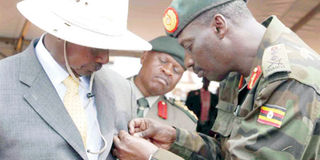MUSEVENI 24 YEARS LATER: How goalposts have shifted in 24 years

PHENOMENAL: Chief of Defence Forces Aronda Nyakairima decorates Gen. Museveni (L) during celebrations to mark the latter’s 24 years in power on Tuesday in Mbale. PHOTO BY GEOFFREY SSERUYANGE
If someone had suggested in 1986 that President Museveni would be in office more than two decades later, that person would have been taken out and shot, or locked away in a mental asylum.
The man who led the National Resistance Army to power was a revolutionary, not a politician. He had waged a people’s liberation war to rid the country of “sectarianism, backwardness and corrupt leadership”.
There was little to suggest that Mr Museveni had any ambitions beyond restoring security, establishing the rule of law, and breathing life into the economy. He openly mocked African leaders who flew to the United Nations in their private jets while their subjects walked around barefoot in stark poverty.
Past regimes chided
He chided previous regimes for importing expensive furniture and whiskies from European capitals and promised to buy his cutlery and furnish State House with cheap, locally-available goods.
Having organised Resistance Councils in liberated areas, the left-wing revolutionary leader spoke of taking power and giving it back to the people to be exercised in a democratic fashion.
However, two decades later, President Museveni is still in power and planning to seek re-election in 2011 which would stretch his reign to 30 years. The revolutionary who argued, in ‘What is Africa’s Problem’, that one of the biggest challenges facing the continent was leaders who over-stayed in office, had the Constitution changed in 2005 to allow him stand for another term in office.
Many observers are now united in the reality that President Museveni has no intentions of handing over power on a silver platter, at least not in the near future.
“He is a political survivor; he knows how to survive and is so determined such that if there is anything in his way he must get rid of it,” says Mwambutsya Ndebesa, a political historian at Makerere University who has known Mr Museveni since 1979. “His ultimate goal has always been power and how to maintain it.”
That long-term strategy of accumulating and retaining power has been achieved through short-term tactics. When the NRA came to power in 1986, it was promised to be a short-term process of normalisation to prepare the country for elections within a couple of years.
In 1989, with growing questions about how many years were required to normalise the country, the lifespan of the National Resistance Council was extended and focus turned to the need for a new Constitution.
In 1994 a Constituent Assembly was elected and a new Constitution, widely applauded for its progressive clauses, including a two-term limit to the presidency, promulgated in 1995, paving the way for elections in 1996.
President Museveni, then at the zenith of his political powers after 10 years in office, ran for his ‘first’ term against Paul Kawanga Ssemogerere and won, despite allegations of foul play.
Besigye dissents
In 1999, Dr Kizza Besigye wrote a stinging paper accusing the ruling NRM of betraying the ideals of the Bush War and not allowing internal debate and dissent. Although Dr Besigye’s concerns were shared by others in the party, President Museveni was re-elected for his ‘second’ and ‘last’ term on the ticket of professionalising the army, and in an election marred by widespread irregularities in favour of the incumbent.
Those, like former minister-turned opposition leader Jaberi Bidandi Ssali, who shared Dr Besigye’s sentiments but had given the President the benefit of the doubt to stand for his last term, were caught unawares when pro-Museveni loyalists started campaigning to lift the two-term limit on the presidency, from around 2003 – with covert but ultimately overt support from President Museveni.
“What stands out is a very unfortunate character of a leader who has a big problem of leaving his word,” says Bidandi Ssali, who was dropped from Cabinet after he publicly opposed the lifting of the term limits.
Prof. Edward Rugumayo, who has known Mr Museveni since 1970, is more charitable in his views towards the President.
“I know him as a man who has been consistent in genuinely wanting to get to power to manage and transform this country,” he says.
Aggrey Awori, who ran against Mr Museveni in 2001, but has since joined government as the ICT minister, says of the President: “A very determined fellow; knows what he is doing, where he has come from and where he is going.”
Others, however, express no surprise about Mr Museveni’s long stay in power and his shifting positions on that and other issues.
Maj. John Kazoora, who joined the NRA out of university in the early 1980s, but has since joined the opposition, says: “I don’t need to tell that to you; he said it himself that he is a chameleon and people didn’t take it seriously.
He was speaking to young people at Makerere before the Bush War. Everything he said was wrong, everything he fought against he has surpassed. He told us in the bush that the 1966 Buganda crisis was a political one and did not require a military solution but he has done the same sending in the military.”
Two views
NRM officials say they have achieved most of the 10-point programme they promised. Critics say President Museveni and his government have acquired the same extravagant tastes of previous regimes (including flying to the UN in one of two private jets and importing State House furniture from abroad), presided over rampant corruption and state patronage, failed to achieve good governance.
Almost 50 years after independence, Uganda has never had a peaceful transfer of power from one elected leader to another.
That is one fundamental change that is yet to happen.




